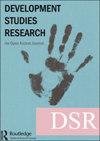从傅的视角审视全球南北发展差距
Q2 Social Sciences
引用次数: 0
摘要
摘要:“不平等发展”:在全球南北之间总是被认为是自然和连续的樱桃叙事。正如事实上所假定的那样,贫穷的根源一直被诊断为发展中国家国内和技术上的不成熟,将在国际经济秩序中找到解决办法。但是,如果南北分歧是由所谓的问题解决方案所孕育的政治调色板的直接产物呢?在他的书《鸿沟:全球不平等及其解决方案简要指南》中,杰森·希克尔抛弃了旧的发展主义公式,挑战了基于外国干预和国际机构议程的发展机器的有效性。作者是伦敦政治经济学院(London School of Economics)的人类学家,他通过历史碎片分析了几个世纪以来以进步的名义为一小部分人造福的经济秩序的核心。因此,他的分析证明,消除不平等和贫困将意味着扰乱国际舞台所依据的世界经济体系。答案吗?最终,接受一个新的经济秩序,愿意接受债务减免,更民主和参与性的机构,以及偏向发展中国家的贸易体系。本文章由计算机程序翻译,如有差异,请以英文原文为准。
A review of the development divide between Global North and South through a Foucauldian perspective
ABSTRACT ‘Unequal development’: a cherry narrative always assumed as natural and continuous between the Global North and South. As de facto assumed, the foundation of poverty has always been diagnosed as a domestic and technical immaturity of developing countries that will find a solution within the international economic order. But what if the North–South divide was the direct product of a political palette nurtured by the supposed solution to the problem? In his book The Divide: A Brief Guide to Global Inequality and its Solutions, Jason Hickel turns his back on old developmentalist formulas, challenging the development-machine effectiveness based on foreign intervention and international institutions’ agendas. The author, anthropologist at the London School of Economics, analyses through historical fragments the core of an economic order built over centuries to benefit a small percentage of mankind in the name of progress. Accordingly, his analysis proves eliminating inequality and poverty would mean unsettling the world economic system the international arena is based on. The answer? Eventually, the acceptance of a new economic order willing to embrace debts liberation, more democratic and participatory agencies, and a biased trading system to favor developing nations.
求助全文
通过发布文献求助,成功后即可免费获取论文全文。
去求助
来源期刊

Development Studies Research
Social Sciences-Development
CiteScore
3.20
自引率
0.00%
发文量
20
审稿时长
12 weeks
期刊介绍:
Development Studies Research ( DSR) is a Routledge journal dedicated to furthering debates in development studies. The journal provides a valuable platform for academics and practitioners to present their research on development issues to as broad an audience as possible. All DSR papers are published Open Access. This ensures that anyone, anywhere can engage with the valuable work being carried out by the myriad of academics and practitioners engaged in development research. The readership of DSR demonstrates that our goal of reaching as broad an audience as possible is being achieved. Papers are accessed by over 140 countries, some reaching over 9,000 downloads. The importance of the journal to impact is thus critical and the significance of OA to development researchers, exponential. Since its 2014 launch, the journal has examined numerous development issues from across the globe, including indigenous struggles, aid effectiveness, small-scale farming for poverty reduction, sustainable entrepreneurship, agricultural development, climate risk and the ‘resource curse’. Every paper published in DSR is an emblem of scientific rigour, having been reviewed first by members of an esteemed Editorial Board, and then by expert academics in a rigorous review process. Every paper, from the one examining a post-Millennium Development Goals environment by one of its architects (see Vandermortele 2014), to ones using established academic theory to understand development-imposed change (see Heeks and Stanforth 2015), and the more policy-oriented papers that contribute valuable recommendations to policy-makers and practitioners (see DSR Editor’s Choice: Policy), reaches a multidisciplinary audience.
 求助内容:
求助内容: 应助结果提醒方式:
应助结果提醒方式:


